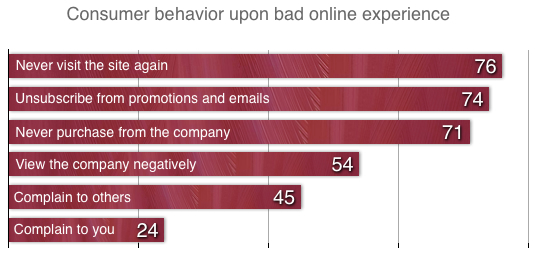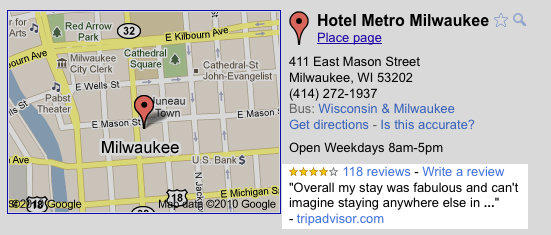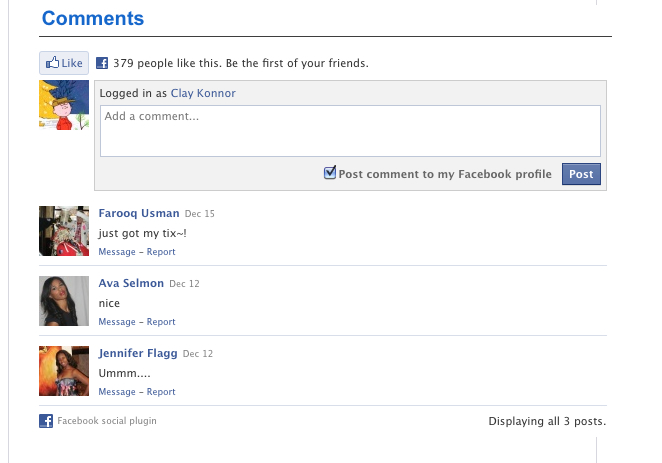“What was that?!” Max Bialystock exclaims. Leo Bloom clears his throat and meekly repeats “under the right circumstances a play with poor reviews and that is a flop could make as much money, or more, than one that is a hit.” In a beautiful example of life imitating art, DecorMyEyes.com used just this approach and for a brief, bright moment proved that such a paradox could be true – that bad customer service could indeed lead to higher Google rankings.
Poor customer or website service and user reaction.
How does poor customer service lead to higher Google rankings? Let’s start with what we know about online consumer behavior. Customers who have a bad user experience, be it on a website or in a local business follow a proven and predictable behavioral pattern; they complain to the world, and not to you. The following chart shows consumer behavior after a bad user experience on a business’ website. *

Users exposed to poorly designed websites or ones that provided poor customer service have some fairly dramatic responses, chief among them is the fact that 45% of them “complained to others” – more than double that complain to the company itself. It is this known metric that DecorMyEyes.com was exploiting.
Bad makes good…temporarily.
Anyone following the trends of search marketing probably saw (with amusement) the story that ran in The New York Times describing how DecorMyEyes.com managed to use negative consumer reviews to substantially boost its Google search ranking. It’s widely known that user ratings, especially those that are re-propagated around the Internet will substantially boost a business’ search rankings. In fact, user ratings have become so heavily weighted in search that they are starting to turn up in local search result strings. Notice in the example below that in a search for “Metro Hotel Milwaukee” a user comment from tripadvisor appears right in the places search result.

Not only do user reviews put a prominent, and uncontrolled, piece of information right within your search result but they collectively boost your search ranking. Now here’s the rub. Through a little creative research DecorMyEyes.com found that negative reviews were just as valuable as positive ones and then did something fairly crazy – knowing that customers are more than twice as likely to comment on poor service than good service they began intentionally dolling out poor customer service. Lo and behold consumers responded as predicted; by posting poor ratings and poor reviews. By virtue of the fact that Google was only counting number of reviews and not whether they were negative or positive, DecorMyEyes.com search rankings skyrocketed.
DecorMyEyes.com may wish to prescribe themselves some lenses for shortsightedness.
Mark Twain once said “It’s one thing to be a crook – but an entirely different matter to be a dumb crook.” In rather suicidal fashion DecorMyEyes.com went on the record in the New York Times boasting about their creative approach. This didn’t, of course, escape the ubiquitous Google ears. They not only heard but also quickly responded. Literally within days of The New York Times article, Google issued this response: “We developed an algorithmic solution which detects companies providing an extremely poor user experience. We can say with reasonable confidence that being bad to customers is bad for business on Google.”
DecorMyEyes further seemed to ignore the fact that they were inviting the possibility of these negative reviews to appear right within their search results. Given the importance of user reviews to consumers this alone was a mortal flaw in their strategy.
The moral of the story: use user ratings and reviews to boost your search ranking.
A 2010 study found that over 60 percent of searchers find ratings and reviews to be important.** This percentage increases when looking at social networkers and mobile users – 78 percent of social networkers and 71 percent of mobile users find consumer ratings and reviews extremely important. Additionally, social networkers and mobile users tend to use ratings and reviews more than any other type of searcher and push those ratings to more online properties. Ratings on citysearch and other user rating sites like yelp, opentable and expedia, for example can be immediately repopulated on the user’s facebook account.
For this reason Johnson Direct recommends:
-
Encourage online ratings and reviews.
Encourage users to leave an online review. Do this at the place of purchase, either online or in the real world. Establish a team of starter reviewers that are friendly to the company to get the ball rolling. Consider offering consumer incentives for user ratings and reviews.
-
Make it easy.
Like all other things in the virtual world, make leaving a rating or review easy for the user. In the virtual world provide users with inline widgets and comment tools that allow them to immediately rate and review your site or products from within your user experience. Below is one of the most popular ways of doing that; the facebook comment widget.

This allows users to both “like” your company or product as well as enter comments that propagate beyond your site to your company facebook page and the users’ facebook feeds. Similarly many online rating sites such as citysearch allow for such inline components. You may also use an iFrame to accomplish this.
-
Respond.
Like any good PR effort, follow up on bad user ratings and reviews. Statistics clearly show companies that engage in a dialog with a user who has posted a poor review will impress readers. We don’t encourage offering compensatory items as this is so easily abused online, but acknowledge the review, ask questions, vow to do better, follow through and then post a message indicating that you have worked on and solved the complaint.
Moreover user ratings and reviews are powerful tools in the search optimization game and better yet they are essentially free. Use them wisely.
*Marketing Sherpa online consumer experience study 2008. Subjects were polled after using websites that provided poor customer service, poor user experience, poor visual design or difficult check-out.
**ComScore 2010 U.S. Search Engine Study